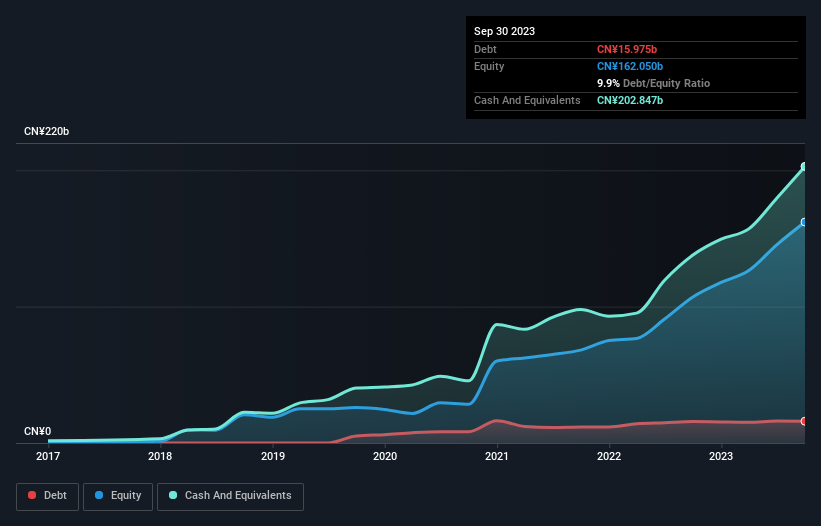We Think PDD Holdings (NASDAQ:PDD) Can Manage Its Debt With Ease
Legendary fund manager Li Lu (who Charlie Munger backed) once said, 'The biggest investment risk is not the volatility of prices, but whether you will suffer a permanent loss of capital.' So it might be obvious that you need to consider debt, when you think about how risky any given stock is, because too much debt can sink a company. We can see that PDD Holdings Inc. (NASDAQ:PDD) does use debt in its business. But the more important question is: how much risk is that debt creating?
What Risk Does Debt Bring?
Generally speaking, debt only becomes a real problem when a company can't easily pay it off, either by raising capital or with its own cash flow. In the worst case scenario, a company can go bankrupt if it cannot pay its creditors. However, a more common (but still painful) scenario is that it has to raise new equity capital at a low price, thus permanently diluting shareholders. Having said that, the most common situation is where a company manages its debt reasonably well - and to its own advantage. When we think about a company's use of debt, we first look at cash and debt together.
Check out our latest analysis for PDD Holdings
What Is PDD Holdings's Debt?
As you can see below, PDD Holdings had CN¥16.0b of debt, at September 2023, which is about the same as the year before. You can click the chart for greater detail. But it also has CN¥202.8b in cash to offset that, meaning it has CN¥186.9b net cash.
How Healthy Is PDD Holdings' Balance Sheet?
According to the last reported balance sheet, PDD Holdings had liabilities of CN¥148.1b due within 12 months, and liabilities of CN¥4.08b due beyond 12 months. Offsetting this, it had CN¥202.8b in cash and CN¥8.69b in receivables that were due within 12 months. So it can boast CN¥59.3b more liquid assets than total liabilities.
This short term liquidity is a sign that PDD Holdings could probably pay off its debt with ease, as its balance sheet is far from stretched. Simply put, the fact that PDD Holdings has more cash than debt is arguably a good indication that it can manage its debt safely.
In addition to that, we're happy to report that PDD Holdings has boosted its EBIT by 61%, thus reducing the spectre of future debt repayments. There's no doubt that we learn most about debt from the balance sheet. But it is future earnings, more than anything, that will determine PDD Holdings's ability to maintain a healthy balance sheet going forward. So if you want to see what the professionals think, you might find this free report on analyst profit forecasts to be interesting.
Finally, a business needs free cash flow to pay off debt; accounting profits just don't cut it. While PDD Holdings has net cash on its balance sheet, it's still worth taking a look at its ability to convert earnings before interest and tax (EBIT) to free cash flow, to help us understand how quickly it is building (or eroding) that cash balance. Happily for any shareholders, PDD Holdings actually produced more free cash flow than EBIT over the last two years. There's nothing better than incoming cash when it comes to staying in your lenders' good graces.
Summing Up
While we empathize with investors who find debt concerning, you should keep in mind that PDD Holdings has net cash of CN¥186.9b, as well as more liquid assets than liabilities. The cherry on top was that in converted 161% of that EBIT to free cash flow, bringing in CN¥83b. So we don't think PDD Holdings's use of debt is risky. When analysing debt levels, the balance sheet is the obvious place to start. However, not all investment risk resides within the balance sheet - far from it. Be aware that PDD Holdings is showing 1 warning sign in our investment analysis , you should know about...
Of course, if you're the type of investor who prefers buying stocks without the burden of debt, then don't hesitate to discover our exclusive list of net cash growth stocks, today.
Have feedback on this article? Concerned about the content? Get in touch with us directly. Alternatively, email editorial-team (at) simplywallst.com.
This article by Simply Wall St is general in nature. We provide commentary based on historical data and analyst forecasts only using an unbiased methodology and our articles are not intended to be financial advice. It does not constitute a recommendation to buy or sell any stock, and does not take account of your objectives, or your financial situation. We aim to bring you long-term focused analysis driven by fundamental data. Note that our analysis may not factor in the latest price-sensitive company announcements or qualitative material. Simply Wall St has no position in any stocks mentioned.

